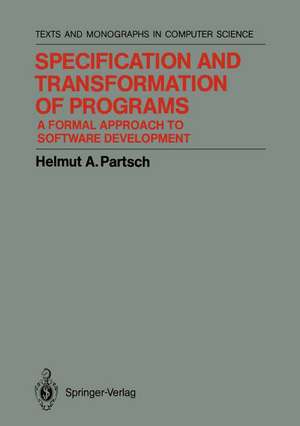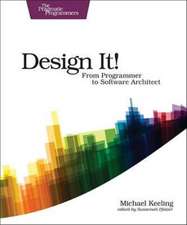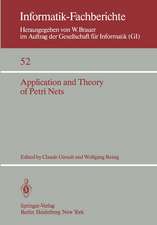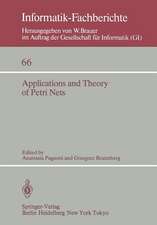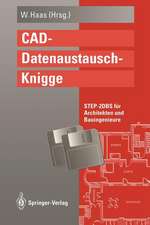Specification and Transformation of Programs: A Formal Approach to Software Development: Monographs in Computer Science
Autor Helmut A. Partschen Limba Engleză Hardback – 5 iul 1990
| Toate formatele și edițiile | Preț | Express |
|---|---|---|
| Paperback (1) | 342.96 lei 6-8 săpt. | |
| Springer Berlin, Heidelberg – 5 iul 1990 | 342.96 lei 6-8 săpt. | |
| Hardback (1) | 357.48 lei 6-8 săpt. | |
| Springer Berlin, Heidelberg – 5 iul 1990 | 357.48 lei 6-8 săpt. |
Din seria Monographs in Computer Science
- 20%
 Preț: 1322.33 lei
Preț: 1322.33 lei - 20%
 Preț: 511.92 lei
Preț: 511.92 lei - 20%
 Preț: 1285.31 lei
Preț: 1285.31 lei - 20%
 Preț: 333.22 lei
Preț: 333.22 lei - 20%
 Preț: 328.60 lei
Preț: 328.60 lei - 15%
 Preț: 646.94 lei
Preț: 646.94 lei - 20%
 Preț: 339.47 lei
Preț: 339.47 lei - 20%
 Preț: 653.21 lei
Preț: 653.21 lei - 20%
 Preț: 329.44 lei
Preț: 329.44 lei - 20%
 Preț: 993.74 lei
Preț: 993.74 lei - 20%
 Preț: 992.26 lei
Preț: 992.26 lei - 20%
 Preț: 1630.95 lei
Preț: 1630.95 lei - 20%
 Preț: 656.03 lei
Preț: 656.03 lei - 20%
 Preț: 650.08 lei
Preț: 650.08 lei - 20%
 Preț: 328.09 lei
Preț: 328.09 lei - 20%
 Preț: 641.16 lei
Preț: 641.16 lei - 20%
 Preț: 334.38 lei
Preț: 334.38 lei - 18%
 Preț: 737.74 lei
Preț: 737.74 lei - 20%
 Preț: 642.19 lei
Preț: 642.19 lei - 20%
 Preț: 641.99 lei
Preț: 641.99 lei - 20%
 Preț: 345.59 lei
Preț: 345.59 lei - 20%
 Preț: 711.29 lei
Preț: 711.29 lei - 20%
 Preț: 1001.16 lei
Preț: 1001.16 lei - 20%
 Preț: 661.47 lei
Preț: 661.47 lei - 20%
 Preț: 343.62 lei
Preț: 343.62 lei - 20%
 Preț: 644.81 lei
Preț: 644.81 lei - 15%
 Preț: 505.30 lei
Preț: 505.30 lei - 20%
 Preț: 640.69 lei
Preț: 640.69 lei -
 Preț: 396.78 lei
Preț: 396.78 lei - 18%
 Preț: 956.81 lei
Preț: 956.81 lei - 20%
 Preț: 592.68 lei
Preț: 592.68 lei - 20%
 Preț: 329.44 lei
Preț: 329.44 lei -
 Preț: 383.33 lei
Preț: 383.33 lei - 20%
 Preț: 349.40 lei
Preț: 349.40 lei - 20%
 Preț: 832.40 lei
Preț: 832.40 lei - 20%
 Preț: 993.42 lei
Preț: 993.42 lei - 15%
 Preț: 578.87 lei
Preț: 578.87 lei - 20%
 Preț: 337.85 lei
Preț: 337.85 lei - 20%
 Preț: 988.16 lei
Preț: 988.16 lei - 20%
 Preț: 996.56 lei
Preț: 996.56 lei - 20%
 Preț: 1293.37 lei
Preț: 1293.37 lei - 20%
 Preț: 1452.94 lei
Preț: 1452.94 lei
Preț: 357.48 lei
Preț vechi: 446.85 lei
-20% Nou
Puncte Express: 536
Preț estimativ în valută:
68.41€ • 71.16$ • 56.48£
68.41€ • 71.16$ • 56.48£
Carte tipărită la comandă
Livrare economică 14-28 aprilie
Preluare comenzi: 021 569.72.76
Specificații
ISBN-13: 9783540523567
ISBN-10: 3540523561
Pagini: 516
Ilustrații: XIII, 493 p.
Dimensiuni: 178 x 254 x 33 mm
Greutate: 1.11 kg
Ediția:1990
Editura: Springer Berlin, Heidelberg
Colecția Springer
Seria Monographs in Computer Science
Locul publicării:Berlin, Heidelberg, Germany
ISBN-10: 3540523561
Pagini: 516
Ilustrații: XIII, 493 p.
Dimensiuni: 178 x 254 x 33 mm
Greutate: 1.11 kg
Ediția:1990
Editura: Springer Berlin, Heidelberg
Colecția Springer
Seria Monographs in Computer Science
Locul publicării:Berlin, Heidelberg, Germany
Public țintă
GraduateCuprins
1. Introduction.- 1.1 Software Engineering.- 1.2 The Problematics of Software Development.- 1.3 Formal Specification and Program Transformation.- 1.4 Our Particular View of Transformational Programming.- 1.5 Relation to Other Approaches to Programming Methodology.- 1.6 An Introductory Example.- 2. Requirements Engineering.- 2.1 Introduction.- 2.2 Some Formalisms Used in Requirements Engineering.- 3. Formal Problem Specification.- 3.1 Specification and Formal Specification.- 3.2 The Process of Formalization.- 3.3 Definition of Object Classes and Their Basic Operations.- 3.4 Additional Language Constructs for Formal Specifications.- 3.5 Structuring and Modularization.- 3.6 Examples.- 3.7 Exercises.- 4. Basic Transformation Techniques.- 4.1 Semantic Foundations.- 4.2 Notational Conventions.- 4.3 The Unfold/Fold System.- 4.4 Further Basic Transformation Rules.- 4.5 Sample Developments with Basic Rules.- 4.6 Exercises.- 5. From Descriptive Specifications to Operational Ones.- 5.1 Transforming Specifications.- 5.2 Embedding.- 5.3 Development of Recursive Solutions from Problem Descriptions.- 5.4 Elimination of Descriptive Constructs in Applicative Programs.- 5.5 Examples.- 5.6 Exercises.- 6. Modification of Applicative Programs.- 6.1 Merging of Computations.- 6.2 Inverting the Flow of Computation.- 6.3 Storing of Values Instead of Recomputation.- 6.4 Computation in Advance.- 6.5 Simplification of Recursion.- 6.6 Examples.- 6.7 Exercises.- 7. Transformation of Procedural Programs.- 7.1 From Tail Recursion to Iteration.- 7.2 Simplification of Imperative Programs.- 7.3 Examples.- 7.4 Exercises.- 8. Transformation of Data Structures.- 8.1 Implementation of Types in Terms of Other Types.- 8.2 Implementations of Types for Specific Environments.- 8.3 Libraries of Implementations.- 8.4 Transformation of Type Systems.- 8.5 Joint Development.- 8.6 An Example: Cycles in a Graph.- 8.7 Exercises.- 9. Complete Examples.- 9.1 Warshall’s Algorithm.- 9.2 The Majority Problem.- 9.3 Fast Pattern Matching According to Boyer and Moore.- 9.4 A Text Editor.- References.
